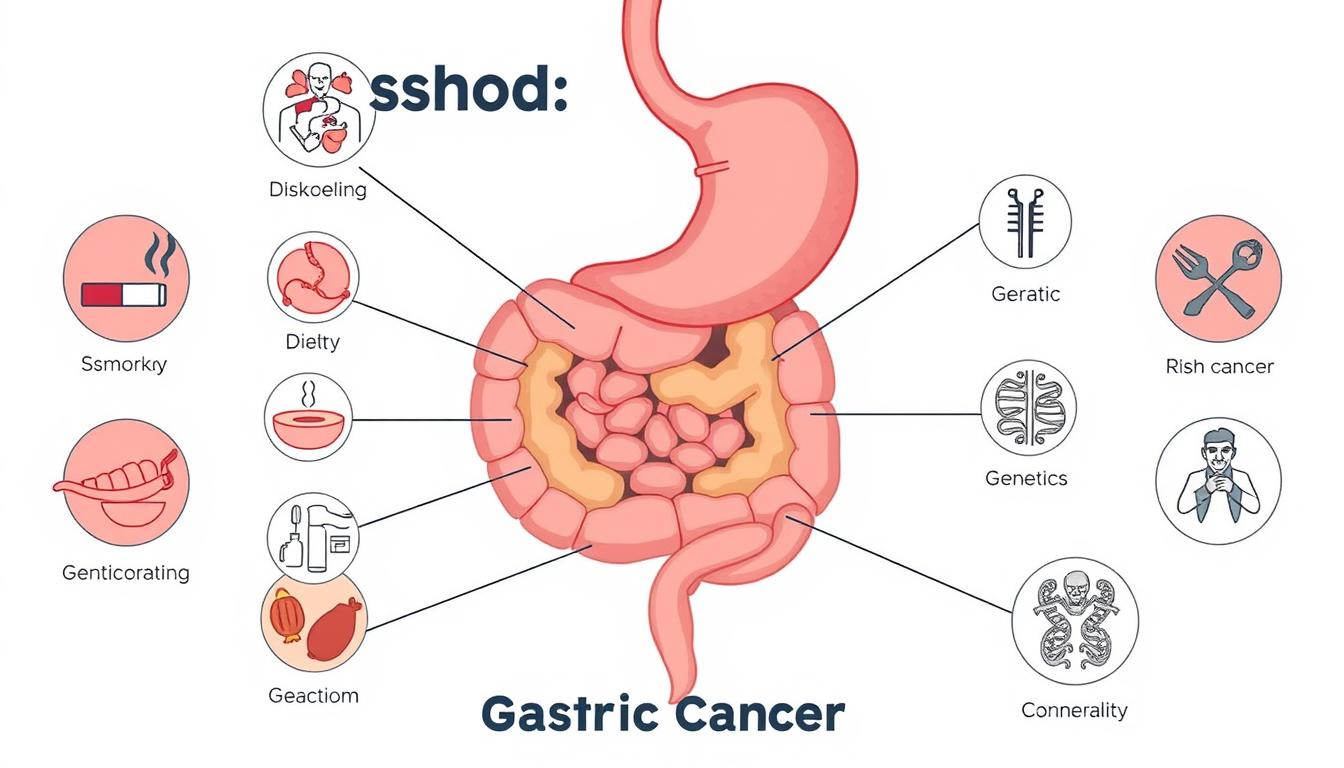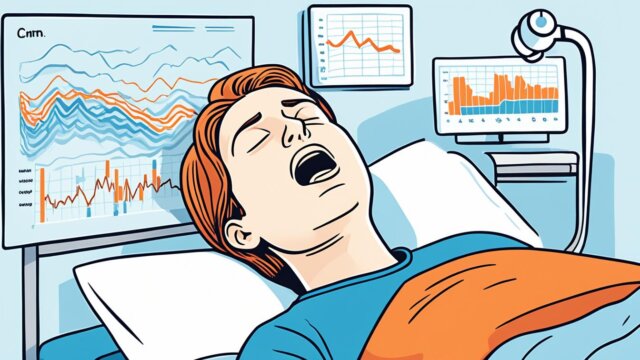FTC disclaimer: This post may contains affiliate links and we will be compensated if you click on a link and make a purchase.
Gastric cancer, also known as stomach cancer, is a big challenge in oncology. It’s the fifth most common cancer worldwide. It’s also the third leading cause of cancer deaths globally. We need to pay close attention to it.
The only way to cure gastric cancer is through surgery. But for those who can’t have surgery, treatments aim to make life better. Knowing about gastric cancer risks and treatments is key to fighting this disease.
Key Takeaways
- Gastric cancer is the fifth most frequently diagnosed cancer worldwide and the third leading cause of cancer deaths globally.
- Factors linked to increased gastric cancer risk include nutritional factors, smoking, radiation exposure, prior gastric surgery, and Helicobacter pylori infection.
- High consumption of fiber, fruits, and vegetables may have a protective benefit against gastric cancer.
- Surgical resection with adequate lymphadenectomy is the only potentially curative treatment approach for gastric cancer.
- For patients with unresectable, locally advanced, or metastatic disease, life-prolonging palliative therapy regimens are the focus.
What is Gastric Cancer?
Types and Pathophysiology
Gastric cancer, also known as stomach cancer, starts in the stomach’s lining. Nearly all stomach cancers are adenocarcinomas. These cancers come from gland cells in the stomach’s inner lining. About 90% to 95% of stomach cancers are adenocarcinomas.
Other rare types include lymphomas, sarcomas, carcinoid tumors, and squamous cell carcinomas.
Gastric adenocarcinomas are divided into two types: the “intestinal type” and the “diffuse type”. The intestinal type has a slightly better chance of survival. But the diffuse type grows and spreads faster.
Hereditary diffuse gastric cancer (HDGC) is an inherited form of the diffuse type. It’s caused by a genetic mutation in the E-cadherin (CDH1) gene.
The “intestinal-type” of gastric cancer often starts from chronic gastritis. This can be due to H. pylori infection, pernicious anemia, or a high-salt diet. It leads to atrophic gastritis, intestinal metaplasia, and eventually adenocarcinoma.
The diffuse type lacks intercellular adhesions. This makes it more likely to grow and spread quickly.
Type of Gastric Cancer | Characteristics |
|---|---|
Intestinal Type | – Morphologically similar to adenocarcinomas in the intestinal tract – Associated with a progression from chronic gastritis – Slightly better prognosis |
Diffuse Type | – Characterized by a lack of intercellular adhesions – Tends to grow and spread more quickly – Includes hereditary diffuse gastric cancer (HDGC) |
Other rare types of stomach cancer include gastrointestinal stromal tumors (GISTs), neuroendocrine tumors (NETs), lymphomas, squamous cell carcinomas, small cell carcinomas, and leiomyosarcomas.
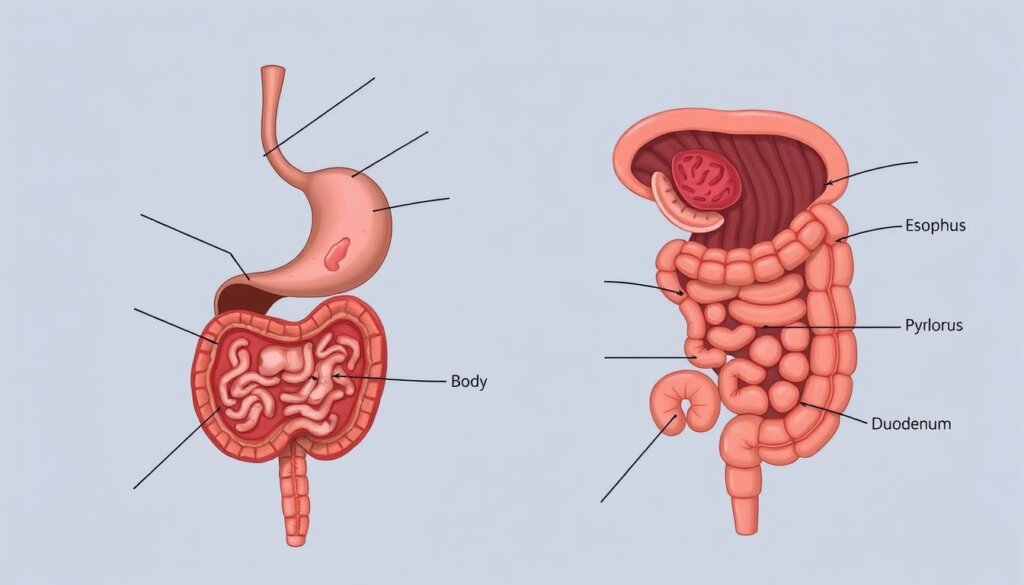
“Differences in the sections of the stomach where cancers start can lead to varied symptoms, outcomes, and treatment options.”
Epidemiology and Risk Factors
Gastric cancer rates are falling globally, but the rate of decline varies by region. In the US, about 28,000 new cases of gastric cancer are expected each year. Around 10,960 people will die from it. Men, especially Black men, are more likely to get gastric cancer than White men.
Studies show that immigrants to the US have lower rates of gastric cancer. This points to the role of lifestyle and environment.
Important risk factors for gastric cancer include H. pylori infection, eating processed meat, a high-salt diet, smoking, and GERD. A study in Europe found a link between H. pylori and gastric cardia cancer. Another study looked at how CagA, a sign of bad H. pylori, affects gastric cancer risk.
A study found that advanced gastric cancer is increasing in young Hispanic men.
Risk Factor | Evidence |
|---|---|
Helicobacter pylori infection | Systematic review and meta-analysis found an association with gastric cardia cancer. |
Processed meat consumption | Meta-analysis showed an association with gastric cancer risk |
High-salt diet | The study reported an increased risk of gastric cancer among Japanese adults |
Smoking | Studies highlighted the association with gastric cancer risk |
Gastroesophageal reflux disease (GERD) | Identified as a key risk factor for gastric cancer |
Genetics also affects gastric cancer, and a study found new genes linked to it. Research has also looked at how the Epstein-Barr virus might cause gastric cancer.
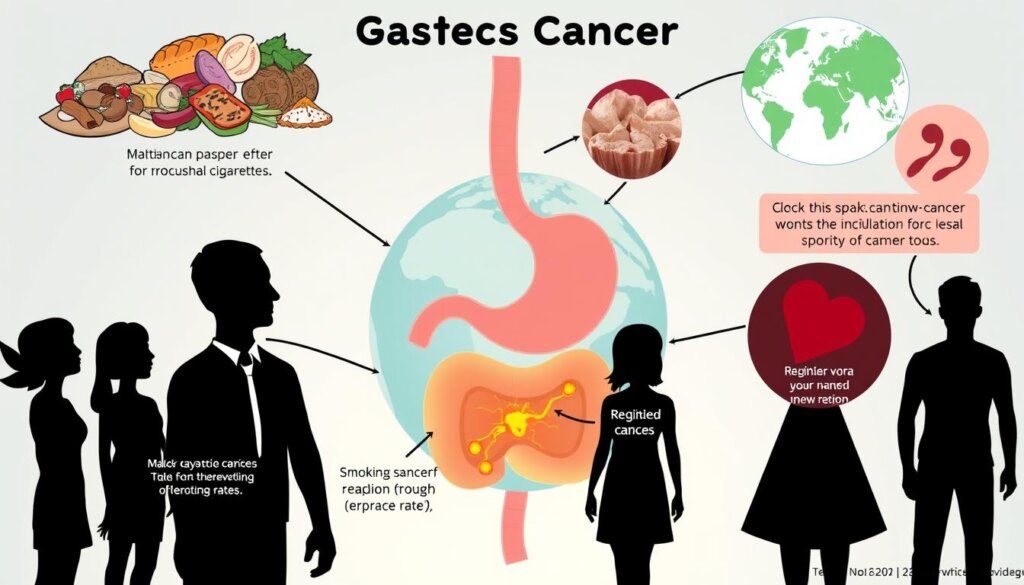
Knowing about gastric cancer’s causes helps doctors prevent and catch it early.
Symptoms and Early Detection
Common Symptoms and Screening
Gastric cancer, also known as stomach cancer, often shows nonspecific symptoms. These symptoms may not show up until the disease is advanced. Symptoms include trouble swallowing, feeling bloated, heartburn, indigestion, nausea, stomach pain, losing weight without trying, and vomiting.
If you have these symptoms for a long time or they get worse, see a doctor. This is important to find out what’s causing them.
Early detection is key to better treatment outcomes for gastric cancer. Tests like upper endoscopy, barium swallow, CT scan, and PET scan help find and screen for gastric cancer. It’s especially important for people at high risk, like those with a family history or chronic atrophic gastritis.
In places like the United States, where stomach cancer screening is not common, most cases are found when the cancer is big or has spread. Early-stage gastric cancer often doesn’t cause symptoms, making it hard to catch early. So, it’s important to know the symptoms and see a doctor if you notice any changes in your health.
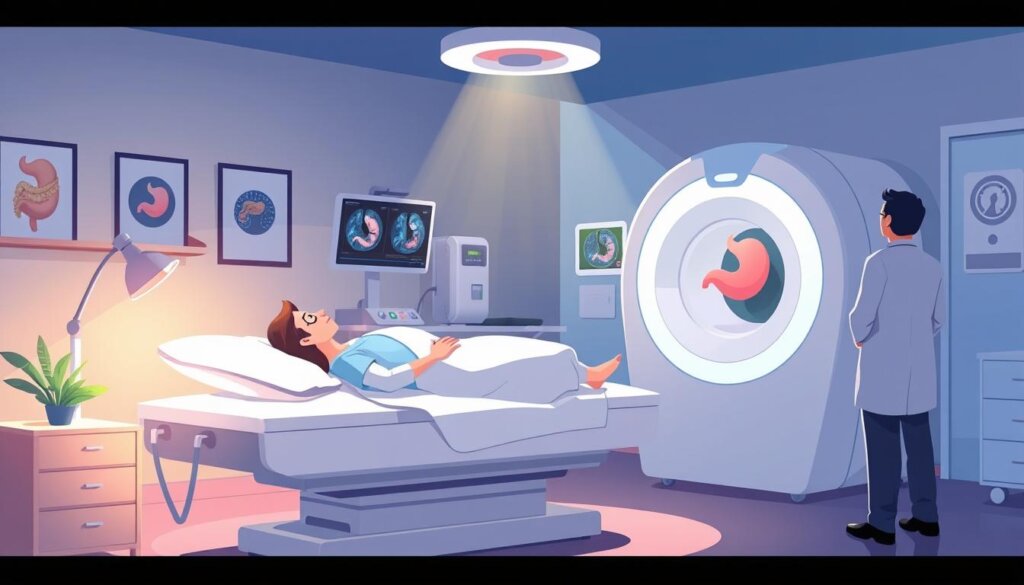
Routine screening and early detection are essential for improving outcomes in gastric cancer.
“Early detection is crucial for improving the prognosis of gastric cancer.”
Gastric Cancer Diagnosis
Diagnosing gastric cancer, also known as stomach cancer, is a detailed process. It starts with a physical check-up and blood tests. These tests look for signs of anemia or blood in the stool.
An upper endoscopy is a key tool. A flexible tube with a camera is used to look inside the stomach. This lets doctors check for any unusual areas, which can then be biopsied.
Sometimes, a barium swallow is used. It’s a series of X-rays of the esophagus and stomach. This helps doctors find signs of stomach cancer.
CT scans are also used. They give detailed images of the body. Injected dye makes the results clearer.
Biomarker testing is very important. It helps find the right treatment for gastric cancer patients.
To know how far the cancer has spread, doctors use different tests. These include endoscopic ultrasound and PET-CT scans. MRI and laparoscopic surgery may also be used.
Getting a second opinion is common. It helps patients understand their condition better and find the best treatment.
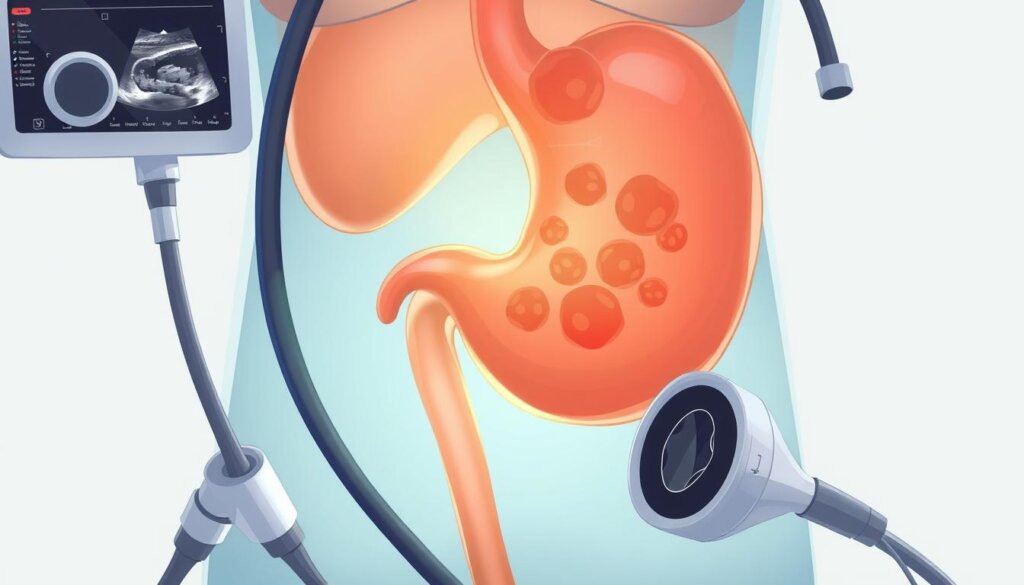
The process of diagnosing gastric cancer is thorough. It’s designed for each patient’s needs. This ensures a correct diagnosis and a good treatment plan.
Treatment Options for Gastric Cancer
Multidisciplinary Approach
Treating gastric cancer needs a team effort. Doctors like surgeons, medical oncologists, and radiation oncologists work together. They make a treatment plan that fits the patient’s needs and cancer stage.
Surgery is a big part of treating gastric cancer. Doctors might remove part or all of the stomach. They also use endoscopic mucosal resection for early-stage cancer.
Chemotherapy is another treatment. Doctors use drugs like capecitabine and cisplatin. Targeted therapies like ramucirumab and trastuzumab are used for specific types of cancer. Immunotherapy drugs like nivolumab help the body fight cancer.
Hyperthermic intraperitoneal chemotherapy (HIPEC) is sometimes used. It involves hot chemotherapy in the peritoneal cavity. Clinical trials offer new treatments for some patients.
Regular tests, like blood tests for CEA and CA 19-9, check if the treatment is working.
“The key to successful gastric cancer treatment is a multidisciplinary approach that combines the expertise of various medical specialists to develop a personalized plan for each patient.”
Treatment Option | Description |
|---|---|
Surgery | Subtotal gastrectomy, total gastrectomy, endoscopic mucosal resection |
Chemotherapy | Capecitabine, cisplatin, docetaxel, doxorubicin |
Targeted Therapy | Ramucirumab, regorafenib, trastuzumab, trastuzumab deruxtecan |
Immunotherapy | Nivolumab, pembrolizumab |
HIPEC | Hyperthermic intraperitoneal chemotherapy |
Clinical Trials | Access to new and experimental treatments |
Prognosis and Survival
The outlook for gastric cancer patients changes a lot based on the disease’s stage at diagnosis. Those with early-stage, treatable gastric cancer have a better chance than those with advanced, untreatable disease.
The 5-year survival rate for gastric cancer in the U.S. is about 36%. But, for those with localized gastric cancer, the rate jumps to 75%.
For regional gastric cancer, the 5-year survival rate is 35%. And for metastatic disease, it’s just 7%. These numbers show how crucial early detection and treatment are for better prognosis and survival rates.
These survival stats come from the Surveillance, Epidemiology, and End Results (SEER) database. They reflect survival rates at the first diagnosis. Age, health, treatment response, and new treatments can also affect a patient’s outlook.
“Gastric cancer prognosis and survival rates have improved in recent years, but there is still significant room for further advancements in early detection and treatment options.”
Prevention and Risk Reduction
There’s no guaranteed way to avoid gastric cancer, but you can lower your risk. Getting rid of Helicobacter pylori is key, as it’s linked to gastric cancer. Eating more fresh fruits and veggies and less processed food also helps.
Don’t smoke, as it raises your risk by 60% for men and 20% for women. If you’re at high risk, like with a family history, get screened often. This can catch cancer early.
Studies show getting rid of Helicobacter pylori can cut your risk by 35%. Also, taking aspirin or NSAIDs can lower stomach cancer risk.
Risk Factor | Effect on Gastric Cancer Risk |
|---|---|
Helicobacter pylori infection | Strong association with initiation and promotion of gastric cancer |
Cigarette smoking | 60% increase in risk for men, 20% increase for women |
Excessive salt intake and insufficient fruit/vegetable consumption | Increased risk of gastric cancer |
Aspirin and NSAID use | Reduced risk of stomach cancer |
By tackling known risks, you can lower your chance of gastric cancer. This helps keep you healthy and well.
Gastric Cancer Research and Advancements
Researchers are working hard to fight gastric cancer. They’re finding better ways to detect it early and treat it. They’re also looking for new ways to predict and prevent the disease.
Gastric cancer is a big problem worldwide. It’s the fifth most common cancer and the fourth leading cause of death. It’s more common in Eastern Asia and Eastern Europe. But it’s less common in Northern Europe, Northern America, and Africa.
Young adults are getting gastric cancer more often. This is a big concern for doctors and researchers.
New treatments like targeted therapies and immunotherapy are helping some patients. Scientists are looking at different biomarkers to find gastric cancer early. They’re also checking if certain blood tests can spot the disease without needing a biopsy.
Studying the genetics and molecules of gastric cancer could lead to better treatments. New methods like liquid biopsy might change how we detect and track gastric cancer.
As scientists learn more about gastric cancer, new treatments offer hope. These advances could make a big difference for people with this disease.
Support and Resources for Patients
Coping and Support Networks
Getting a gastric cancer diagnosis can feel overwhelming. But, there are many ways to get help. CancerCare and others offer counseling, help finding resources, financial aid, and special programs.
Talking to others who have had gastric cancer can be very helpful. You can find support online or in local groups. Doctors and social workers can also help you find the right services.
- Counseling to deal with the emotional side of a diagnosis
- Help finding financial aid, transportation, and more
- Support groups to share and connect with others
- Workshops and Q&A sessions to learn about treatments
- Meal delivery program for nutritious meals during treatment
CancerCare is not the only place to find help. There are many personal stories and resources online. With these resources, patients can get the support they need during a tough time.
Resource | Description |
|---|---|
Tumor Analysis | Provides info and access to molecular profiling for treatment. |
Financial & Insurance Assistance | Helps with paying for healthcare. |
Clinical Trials | Insights into new treatments for stomach cancer. |
Support Groups | Offers support in different ways. |
Hope Webinars | Webinars on the latest in fighting gastric cancer. |
Mentor Program | One-on-one support from those who have had cancer. |
Yoga | Virtual sessions on mental health and wellbeing for women. |
Books |
|
“Connecting with other gastric cancer survivors has been a lifeline for me. It’s comforting to know that I’m not alone in this journey, and the shared experiences have been invaluable.”
By using the support and resources out there, gastric cancer patients can cope better. Whether it’s counseling, support groups, or educational programs, these help a lot.
Conclusion
Gastric cancer, or stomach cancer, is a serious condition. It needs a deep understanding of risks, symptoms, and treatments. While the incidence of gastric cancer has been falling, it’s still a big worry in some parts of the world.
Healthcare teams are working hard to find better ways to fight this disease. They are using new ways to spot it early and treat it. This includes using special tests to see how the cancer might grow.
They are also looking into ways to stop the cancer before it starts. This could mean removing part of the stomach in some cases. This could help people with a family history of stomach cancer live longer.
It’s all about working together to beat gastric cancer. By knowing the risks and acting early, people can help their doctors. This way, they can manage the disease better and live a fuller life.
FAQ
What is gastric cancer?
Gastric cancer, also known as stomach cancer, starts in the stomach. It’s the fifth most common cancer and the third leading cause of death from cancer worldwide.
What are the main types of gastric cancer?
Gastric cancer has two main types. The “intestinal type” looks like cancers from the intestine. The “diffuse type” has cells that don’t stick together. Hereditary diffuse gastric cancer is a rare inherited form caused by a CDH1 mutation.
What are the risk factors for gastric cancer?
Risk factors include Helicobacter pylori infection and eating processed meat. A high-salt diet, smoking, and gastroesophageal reflux disease also increase risk. Other factors include diet, radiation, and past stomach surgery.
What are the common symptoms of gastric cancer?
Symptoms include trouble swallowing and feeling bloated. Feeling full quickly, heartburn and stomach pain are also common. Nausea, weight loss, and vomiting can occur too. These symptoms often show up late in the disease.
How is gastric cancer diagnosed?
Doctors start with an upper endoscopy to look inside the stomach. If they find something, they take a biopsy. Tests like CT scans and endoscopic ultrasound help figure out how far the cancer has spread.
What are the treatment options for gastric cancer?
Treatments include surgery, chemotherapy, and radiation. Targeted drug therapy and immunotherapy are also options. The best treatment depends on the patient and the cancer’s stage.
What is the prognosis for gastric cancer patients?
Survival depends on when the cancer is found. Early-stage cancer has a better chance of treatment success. In the U.S., the 5-year survival rate is about 32%. But, it’s much higher for early-stage patients.
How can gastric cancer be prevented?
Preventing gastric cancer is hard, but steps can help. Eradicate Helicobacter pylori, eat more fruits and veggies, and avoid processed foods. Quit smoking and watch salt intake. Regular check-ups can catch it early.
What are the latest advancements in gastric cancer research?
Research aims to improve detection and treatment. New therapies and biomarkers are being explored. Targeted and immunotherapy show promise. Genetic studies will lead to better treatments.
What support resources are available for gastric cancer patients?
Getting a diagnosis is tough, but help is available. Online and local groups offer support. Healthcare workers can guide patients and help find resources.
